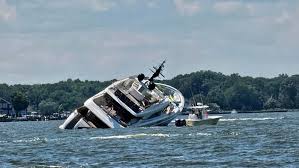Annapolis, known as the sailing capital of the United States, is a hotspot for boating enthusiasts. However, even in this maritime haven, accidents like a capsized yacht in Annapolis remind us of the unpredictable nature of water and the importance of boating safety. In this article, we’ll explore the causes, consequences, and lessons learned from such incidents, ensuring boaters are well-prepared to navigate the waters safely.
The Capsized Yacht Incident in Annapolis: What Happened?
Annapolis, with its picturesque Chesapeake Bay and bustling marinas, has seen its fair share of boating accidents. One of the most alarming incidents in recent years was the capsized yacht in Annapolis, which left both authorities and boaters grappling with questions about safety and preparedness.
While specific details vary from incident to incident, capsizing often occurs due to a combination of factors, including adverse weather, overloading, and mechanical failure. In the Annapolis case, eyewitnesses reported high winds and rough waters, conditions that can easily destabilize even a well-maintained yacht.
Also Read: Drew Brees Hair: A Closer Look at the NFL Legend’s New Style
Common Causes of Yacht Capsizing
1. Adverse Weather Conditions
Strong winds, large waves, and sudden storms are common culprits behind capsizing incidents. Annapolis, situated near the Chesapeake Bay, experiences rapidly changing weather patterns, making it crucial for boaters to stay informed.
2. Overloading
Overloading a yacht with too many passengers or heavy cargo can affect its stability. This was a suspected factor in the capsized yacht in Annapolis, highlighting the importance of adhering to weight limits.
3. Mechanical Failures
Issues like engine failure, steering problems, or hull breaches can lead to loss of control, increasing the risk of capsizing.
4. Operator Error
Inexperienced or inattentive operators can make critical mistakes, such as misjudging wave heights or turning too sharply, leading to accidents.
Consequences of a Capsized Yacht
A capsized yacht can result in significant consequences, including:
- Loss of Life or Injury: Tragically, accidents can lead to injuries or fatalities if passengers are not wearing life jackets or cannot swim.
- Environmental Damage: Spilled fuel and debris from the yacht can harm the marine ecosystem.
- Financial Loss: Repairs, replacements, and legal liabilities can be financially draining for yacht owners.
Lessons Learned From the Capsized Yacht in Annapolis
The capsized yacht in Annapolis serves as a wake-up call for boaters everywhere. Here are key takeaways to enhance safety on the water:
1. Monitor Weather Conditions
Always check the weather forecast before heading out. Use reliable marine weather apps and stay updated on any sudden changes.
2. Adhere to Weight Limits
Ensure your yacht is not overloaded. Distribute weight evenly to maintain balance and stability.
3. Conduct Regular Maintenance
Regularly inspect your yacht for mechanical issues, including the engine, steering system, and hull integrity.
4. Invest in Safety Equipment
Equip your yacht with life jackets, flares, fire extinguishers, and a VHF radio. Ensure all passengers know how to use them.
5. Take Boating Safety Courses
Enroll in a boating safety course to learn essential skills, including navigation, emergency response, and handling rough waters.
Annapolis Boating Culture and Safety Regulations
Annapolis boasts a rich boating culture, hosting events like the United States Sailboat Show. However, with great activity comes the responsibility of ensuring safety. The Maryland Natural Resources Police enforces strict boating regulations to prevent accidents like the capsized yacht in Annapolis. Key rules include:
- Life Jacket Requirements: All boats must carry U.S. Coast Guard-approved life jackets for every passenger.
- Alcohol Restrictions: Operating a boat under the influence of alcohol is illegal and increases the risk of accidents.
- Speed Limits: Abide by posted speed limits, especially in no-wake zones.
What to Do If Your Yacht Capsizes
Despite precautions, accidents can still happen. If your yacht capsizes, follow these steps:
- Stay Calm: Panic can make the situation worse. Stay as calm as possible to think clearly.
- Stay With the Boat: Unless the boat is sinking or drifting into dangerous waters, staying with it increases your chances of being spotted by rescuers.
- Signal for Help: Use flares, whistles, or a VHF radio to alert nearby boats or the Coast Guard.
- Climb Onto the Hull: If possible, climb onto the overturned hull to stay out of the water and conserve energy.
FAQs
1. How common are capsizing incidents in Annapolis?
While Annapolis sees a fair share of boating traffic, capsizing incidents are relatively rare. However, they often result from a combination of poor weather, overloading, or operator error.
2. What should I do to avoid capsizing?
Follow boating safety guidelines, monitor weather conditions, avoid overloading, and ensure your yacht is well-maintained.
3. Are life jackets mandatory in Annapolis?
Yes, Maryland law requires all boats to carry U.S. Coast Guard-approved life jackets for every passenger.
4. Can capsizing cause environmental damage?
Yes, capsizing can result in fuel spills and debris, which harm marine life and water quality.
5. What is the best way to learn boating safety?
Enroll in a certified boating safety course offered by organizations like the U.S. Coast Guard Auxiliary or the Maryland Natural Resources Police.
Conclusion
The capsized yacht in Annapolis highlights the unpredictable nature of boating and the importance of safety measures. Whether you’re a seasoned sailor or a novice, adhering to boating regulations, maintaining your vessel, and staying informed about weather conditions can prevent such incidents. By learning from past accidents, we can ensure that Annapolis remains a safe and enjoyable destination for all boating enthusiasts.
Boating is a rewarding experience, but safety should always be a top priority. Stay prepared, respect the water, and enjoy the beauty of Annapolis responsibly.

